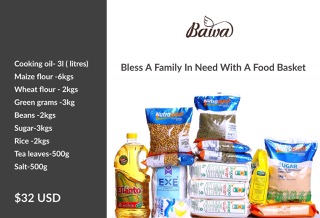A Small Appeal From A Spirited Group Of People
Eighty percent of Kenya’s workforce works in the Jua Kali sector, Kenya’s informal economy. Jua Kali is a Swahili term for ‘hot sun’. The sector is so named because in its beginnings, Kenya’s informal economy was made up of workers who made and sold their products from makeshift sheds under the hot sun.

With global economies reeling from the effects of COVID-19, Kenya is hard hit. Workers in the Jua Kali sector, which runs 24 hours a day, 365 days a year, are bearing most of the brunt. Most Jua Kali workers in informal settlements depend on daily wages. With these wages, they buy meals for their families and put a little aside for rent at the end of the month and school fees for their children. The children, when they attend school, are guaranteed at least one meal a day
Kenya’s government gave a cessation of movement order about two months ago. The order dictates that citizens must be in their homes by 7 PM every evening and cannot leave until 5 AM the next morning. No movement of people is allowed between cities and schools are closed until further notice. All healthcare efforts have been directed towards fighting the virus. This means reduced work hours which means reduced wages. The children are out of school and are no longer guaranteed a daily meal. Other problems compounded by reduced wages include lack of adequate sanitary products and water to keep safe, reduced access to healthcare due to focus on the virus and lack of access to tools, internet and home-schooling facilities for the children.
Bawa Hope artisans are all in the Jua Kali sector and live in informal settlements. They make world class jewellery, but COVID-19 has slowed business down, leaving them in dire straits. One of the artisans, a woman living with HIV, has six children. They are all home with her and are no longer guaranteed a meal daily. She must figure out how to feed them and pay for her HIV medication, which costs her Ksh. 6,000 ($60) every month. This makes it impossible for her to pay the Ksh. 10,000 ($100) a month rent for the new house she and her children have just moved into. Now that some of her children are older, they needed a bigger house. There is no way she could have foreseen the coming pandemic. She has barely had time to cultivate a relationship with her landlord, who has vowed to kick her out. She did not know what steps to take when we last spoke to her.
This, unfortunately, is the situation more of the artisans we work with are finding themselves in as the pandemic runs its course.
Bawa Hope, in the spirit of togetherness, is doing as much as we can to cater for their immediate needs. But we cannot do this alone. Please click on the DONATE button on our website to make contributions to keep the artisans going. We need donations towards care packages so that the artisans and their families do not go hungry. We need sanitizers, face masks and other hygiene supplies to help them keep safe from COVID-19. We need to help them raise rent money for the next three months. Your generosity towards this will go a very long way and, as always, your orders and purchases are crucial.
The artisans are ready and willing to work and Bawa Hope has all COVID-19 safety guidelines in place. Thank you for your partnership and we look forward to your continued support.
 (1).png)